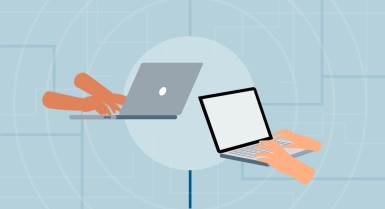Tech's hidden ROI: Advisor tips to maximize your tech stack
Key Points
-
Technology can be viewed as overhead, but the real ROI is about people—and helping employees do their jobs and serve clients even better.
-
- Integrated portfolio management and CRM systems help firms move data and carry out tasks more efficiently.
-
- To develop a digital mindset, you need to build a culture that embraces technology and allows everyone to improve it.
Technology that's hard to use or out of sync with how people really work doesn't help registered investment advisor (RIA) firms be their best. It can also stand in the way of client relationships. A strategic, purposeful tech stack is people focused. It allows people to work more efficiently so they can give clients more attention, insight, and options.
"Ultimately, this is a human business," says Matt Reiner, Managing Partner at Capital Investment Advisors. "All our decisions about technology come down to one question: Are we giving our team more time to spend with clients?"
Tech-forward firms focus on what helps their advisors and clients most:
- Integrated systems that make information and tools easier to use
- A CRM system that maximizes the firm's client service potential
- Cloud technology that helps advisors and clients collaborate
- Security expertise to protect client and firm data
- A digital mindset that helps everyone at the firm work together.
See how Matt and Jamie Wilson, COO of Capital Advisors, are implementing technology that's helping advisors do and be their best.
Integration is about connection
Portfolio management systems are the data backbone of many RIA firms—thanks to integration. As you develop your technology strategy, portfolio management is a good place to start because it can help you think through how the different systems you use can share information.
Fortunately, portfolio management system vendors have prioritized integration, working with custodians and other technology providers to standardize how data is coded. Today, it's easier than ever to move data to and from portfolio management systems, CRM systems, financial planning systems, and more.
With integrated systems, staff members can focus on what they do best. Rather than become superusers for every system at the firm, each team member can do most of their work in one system and trust that they're getting the information they need. For advisors, this means that when a client is on the phone, the advisor doesn't have to keep moving between windows and scrambling for data. It's all a click or two away.
Back-office staff often see the biggest benefits of integration because it eliminates the need to manually move data, enter data multiple times, and perform other time-consuming tasks. Integration also reduces errors, decreasing the number of times that teams have to scramble to help an upset client.
Harness the power of your CRM
Some firms use their customer relationship management system (CRM) to store client data and little else.
"A lot of the industry uses the CRM like a big, expensive Rolodex," Matt says. "But there are so many capabilities, from automated workflows to integration. For example, Salesforce can integrate into calendars and your email marketing like HubSpot or MailChimp".
Calling her firm's CRM "the heartbeat of our organization," Jamie believes advisors should think bigger. Much bigger. Jamie's advice? Take full advantage of your CRM's capabilities with a focus on delivering a great client experience and saving time.
With an integrated CRM, you have an engine that can power nearly every task, reducing errors and streamlining processes. If your current CRM is clunky or doesn't do enough for employees and clients, it's worth exploring new options.
Read about how Jamie's firm embraced technology and transformed client service with its CRM.
Clients are in the cloud
More than ever, clients expect timely communication and the ability to see their money at work.
Zoom calls and screenshares have become the norm, and many clients have gotten comfortable with new technology tools such as DocuSign, eApprovals, and digital transfers. Clients not only use these tools—they value how technology allows them to get what they need quickly and easily.
Cloud-based technology can make one-on-one conversations more dynamic and productive, too. With a tablet to display integrated portfolio management and financial planning software, advisors can show clients where they stand in real time. They can also run scenarios and let clients see how different approaches can affect their savings.
Cloud technology is also giving clients more access and control. Many clients can now log in to a brand client portal via their advisor's website. Through the portal, they can see information about their finances and investments and carry out select tasks such as approvals, giving them greater transparency and making it easier for them to work with their advisors.
Security demands expertise
Clients' wealth and a firm's reputation depend on secure technology. That's why many small- and medium-sized firms outsource their IT. Virtual IT experts can help firms monitor for malware, run data backups, set up virtual private networks (VPNs) to encrypt data as it moves through the Internet, and make sure the firm is always operating with the most secure hardware and software.
A virtual IT provider can also be a strategic partner to help RIA firms develop technology plans, including incident response and disaster recovery plans. As we've seen in recent years, both large and small organizations have been targeted by hackers. Every firm needs a plan to ensure that breaches are detected and repaired quickly.
Get a preview of resources, tools, and tips that independent RIAs can use to protect themselves and their clients from cyber threats.
Build a digital culture
Matt's firm also set out to build a digital culture. He developed what he calls a culture of learning, one that empowers everyone to suggest changes to digital processes, take the lead on training others, and troubleshoot issues.
"Trying new things may mean running into challenges and hurdles—and even failing. We strive to learn from it," Matt says.
At Capital Investment Advisors, the whole firm feels a sense of responsibility for making sure its technology works well and is doing as much as possible. They also have the experience and expertise to get creative, finding new ways to use existing tools.
Read about how Matt's firm successfully tackled DocuSign integration.
Get more from your technology
Technology doesn't get easier the more you put off making upgrades. Firms that proactively plan for and implement technology upgrades are often happier, more productive, and better able to rise to business opportunities.
"Technology was crucial to our growth," says Jamie. "We've embraced it."
Once advisors see productivity boosts and enhanced client service, RIA firms often add more digital tools. Scheduling software, automated communications, an AI texting platform, and more can help firms be responsive to clients without spending a lot of time on small tasks.
What's important to keep in mind is that more technology or bigger, more complex systems aren't necessarily going to deliver more time for an RIA team. The key is to make sure that the tech fits the firm and that staff members are trained to take full advantage of what the tools offer.
What you can do next
If you already work with Schwab:
- Learn how to jumpstart your digital journey with Schwab's digital tools.
- See how your adoption of core Schwab tools measures up to your peers with our technology adoption dashboard.
If you don't yet work with Schwab, consider a custodian that is invested in your success. Contact us to learn more about the potential benefits of a custodial relationship with Schwab.



